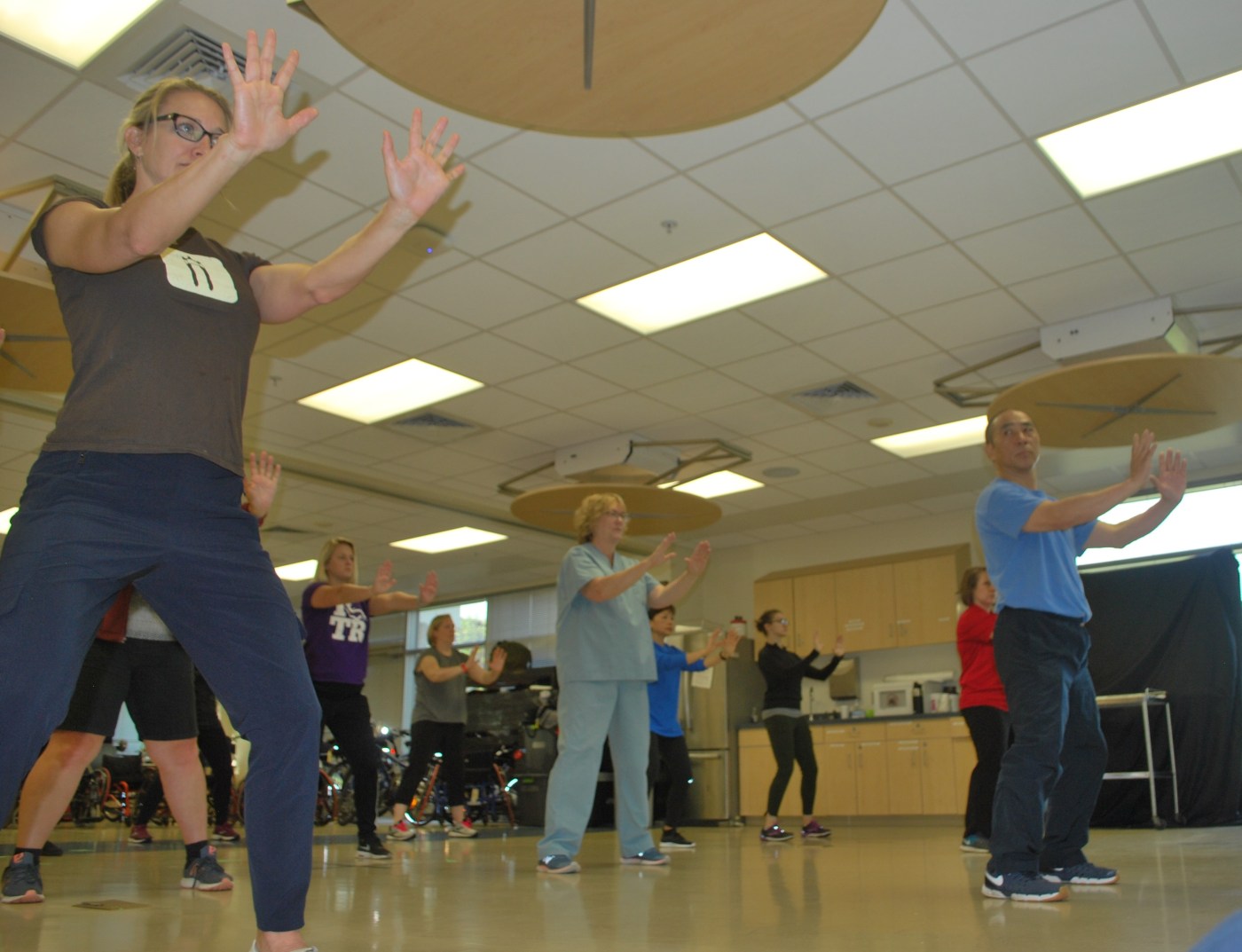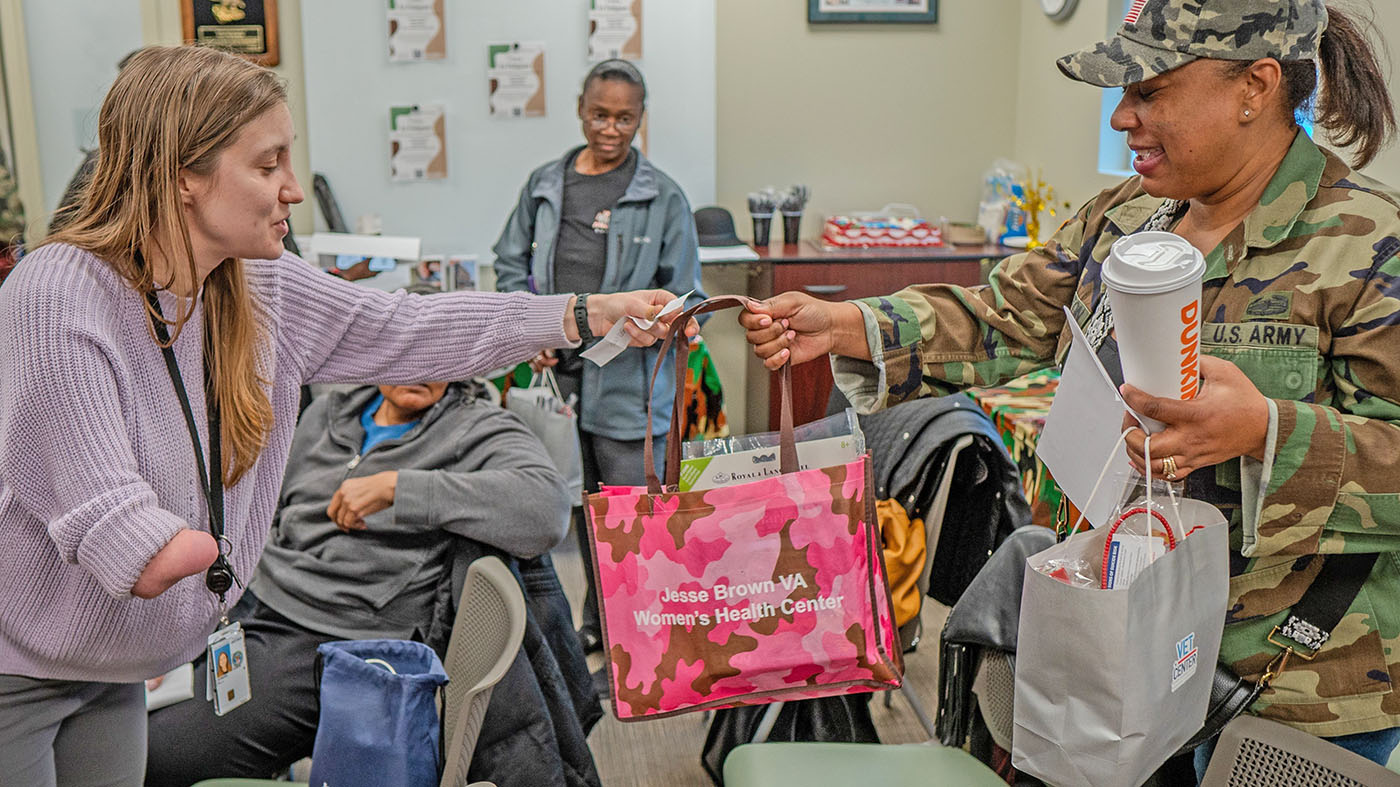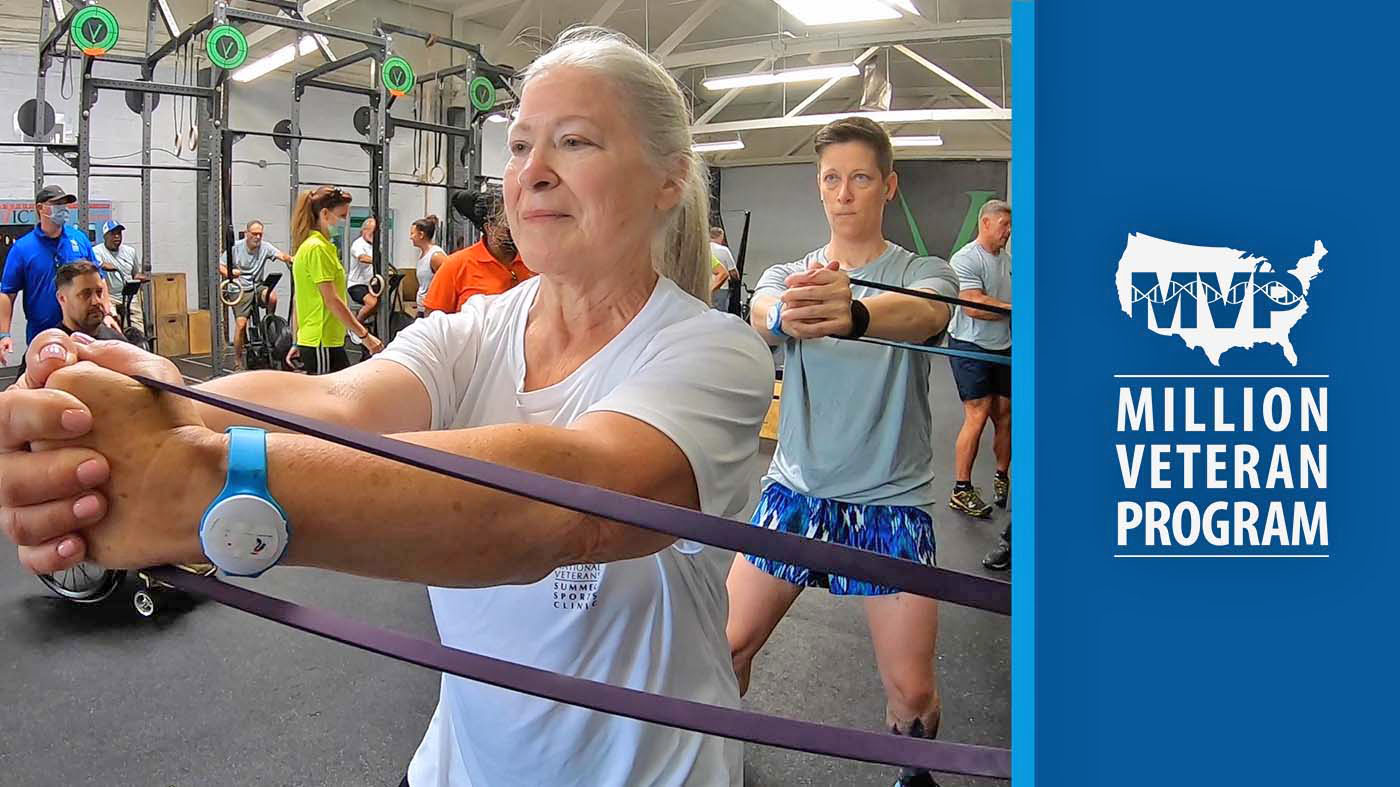Pan flute music like an old-time kung fu movie drifts serenely through the recreation room of the Milwaukee VA’s Spinal Cord Injury Center. Zibin Guo talks of swaying breezes, mountain streams and the peaceful but powerful force of nature.
“Still… like a mountain,” he says. “Flow… like water.”
The group follows his every move from their chairs, pivoting wheels as he turns on foot. This new twist on an ancient martial art, Guo says, will play a big role in the modern-day treatment of pain and post-traumatic stress, even cutting down on opioids and other painkillers.
The three-day wheelchair tai chi seminar for health care workers from the Milwaukee and Madison VA Medical Centers; Appleton, Wisconsin, Clinic; and community hospitals, is part of Guo’s nationwide tour to teach more instructors, collect data and prove tai chi works.
Guo, a medical anthropologist from the University of Tennessee-Chattanooga, has received more than $200,000 from the Adaptive Sports Grant Program, and has already traveled to 24 VA medical centers. He hopes to get to 24 more by next year.
The grant program, managed by the National Veterans Sports Program and Special Events Office, provides $15 million annually to support studies and adaptive sports for disabled Veterans. Guo said his goal is to promote a way to rethink western rehabilitative medicine, based on bodily functions of eastern philosophy.
“There is a mental clarity that comes from tai chi, which then creates physical benefits for the whole body,” he said.
“For some people,” he added, “this can be psychological. If someone is in a wheelchair, they may see themselves as disabled and are labeled that way. When you are labeled as disabled, you become disabled.
“Wheelchair tai chi transforms the idea of the wheelchair into something else. Now, it’s no longer just for transporting from one place to another. You use it to create power and beauty, integrating the chair movements with tai chi.”

Zibin Guo leads health care workers through one of his tai chi routines. He first taught the group standing up and then in wheelchairs. Guo believes regular tai chi can significantly help treat post-traumatic stress and reduce the use of painkillers.
Guo said some VAs have already learned the healing benefits while others are just starting to add tai chi to their repertoire.
“Especially now as VA is building up its Whole Health program nationwide, I hope we are going to see more of these types of offerings,” he said.
Milwaukee was one of the first VAs to offer tai chi. Its polytrauma department started it in 2012 with another grant from the Adaptive Sports Program. Guo’s techniques provided a different perspective, said Dr. Judith Kosasih, lead physician in Physical Medicine and Rehabilitation.
“I knew when we started this seven years ago it was going to be valuable, and I believe in it,” she said. “Right now, we teach tai chi fundamentals, but he gives us a completely different perspective, with more movement, even in a wheelchair.”
Kosasih first started tai chi in Milwaukee, believing it would help with Parkinson’s Disease and pain.
“The practice helps you relax, helps you sleep better. When you sleep better, you will feel better,” she said. “I guarantee it improves endurance, balance, memory and you will be able to stand longer. It gives our Veterans skills and empowers them to develop this and get better.”
It’s also a gateway to health for those who can’t afford other sports.
Guo said: “Paralympics and wheelchair rugby and basketball is great but think about how much just one of those chairs costs. The average person doesn’t have a chance. One percent can get the specialized chair and 99 percent can’t. Wheelchair tai chi gives people self-empowerment. You don’t need a special chair.
“There are so many physical benefits,” he added. “A lot of studies have already demonstrated that the nature of the movements is so unique, and the circular motion creates powerful circulation in the body. It’s not just the blood, but the energy, and that treats a wide range of problems without drugs—it treats pain, it treats headaches. There are so many benefits.”
Besides teaching others how to teach the class, he is asking them to compile data to prove his point. He pointed to one Veteran in Tennessee, who said she used tai chi to drastically cut down on painkillers.
Zarita Croney, an Afghanistan Veteran, suffered from post-traumatic stress, three bulging discs, one eroded disc and intermittent paralysis, plus a host of other issues.
“I had to have a huge purse just for all my meds. You’d look inside and see nothing but pill bottles.” While still in the military, she said she cycled through an array of pain medications. “I’d have to lay in bed for three hours, just waiting for the medicine to work,” she said.
Croney spiraled into depression until she reached out to the Tennessee Valley Health Care System for mental health. Her VA recommended recreation therapy, including the tai chi Guo promotes.
“The first time in tai chi, they had to wheel me there in a wheelchair,” she said. “The first few visits, I couldn’t get through the whole class. Then I start getting more range of motion. My instructor said, ‘Even if you can’t do it, see yourself doing it in your mind.’ And as you go along, your body does catch up with what the mind is doing.
“I went from visiting the emergency room at least once a month to get shot up with morphine, to walking with a cane, and sometimes without the cane. I’ve cut out about three-fourths of the pills I was on,” she said. “With all these things, it’s a battle every day, but tai chi gave me the foundation.”
Guo says this is nothing new to him.
“Pain symptoms are very complex and not just physical. The symptoms of stress, tension, or anger and bad emotions, that creates chemicals in the brain that stimulate pain,” he said. “Tai chi not only relaxes, it promotes healing.”
Leanne Young, a recreation therapist from the San Francisco VA Health Care System, said she is excited to see tai chi and other eastern philosophies gain more acceptance, because it plays into what she and other therapists have been doing for years.
“This is definitely time for this,” she said. “I think most people want to see evidence-based practice and data. They want to see research. Many things recreation therapists have done—not just tai chi, but in general—hasn’t always been recognized because there isn’t always research that supports the benefits.
“I really feel tai chi is a whole mind-body thing, and that really works. Your brain ends up telling your body what to do. It’s mindfulness, and to me, it’s a state of mind which affects your body and your pain reduction.”
Gary Kunich is a public affairs officer at the Milwaukee VA Medical Center and currently works for the National Veterans Sports Program.
Topics in this story
More Stories
Navy Veteran and president of the American Medical Association got a colonoscopy and encourages other Veterans to do the same.
Chicago Vet Center and VA gave women Veterans information on VA services available to them.
MVP’s research informs personalized care for Veterans, supporting whole health and beyond.






